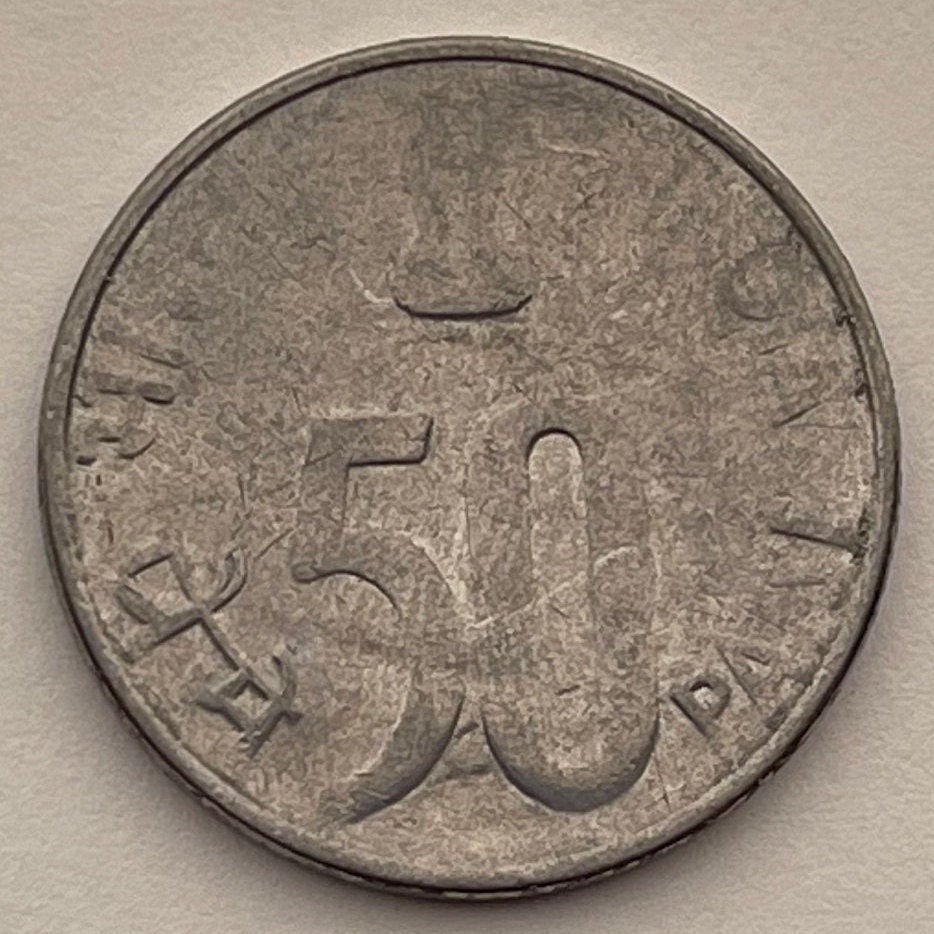elemintalshop
Parliament House & India Map 50 Paise Authentic Coin Money for Jewelry and Craft Making (New Delhi) (Lion Capitol of Ashoka)
Parliament House & India Map 50 Paise Authentic Coin Money for Jewelry and Craft Making (New Delhi) (Lion Capitol of Ashoka)
Couldn't load pickup availability
Parliament House & India Map 50 Paise Authentic Coin Money for Jewelry and Craft Making (New Delhi) Lion Capitol of Ashoka
Reverse
Map in background with circular Parliament house building in New Delhi on top. Date below, lettering top right.
Lettering:
भारत INDIA
Obverse
Large denomination at bottom with Lion Capitol of Ashoka symbol above. Lettering both sides.
Lettering:
भारत INDIA
सत्यमेव जयते
पैसे 50 PAISE
Features
Issuer India
Period Republic (1950-date)
Type Standard circulation coin
Years 1988-2007
Value 50 Paise (0.5 INR)
Currency Rupee (decimalized, 1957-date)
Composition Stainless steel
Weight 3.79 g
Diameter 22 mm
Thickness 1.45 mm
Shape Round
Orientation Medal alignment ↑↑
Demonetized 06-30-2011
Number N# 1606
References KM# 69, Schön# 215
Wikipedia:
The Parliament House (Hindi: Sansad Bhavan, transl. Parliament Building) in New Delhi is the seat of the Parliament of India. At a distance of 750 meters from Rashtrapati Bhavan, it is located on Sansad Marg which crosses the Central Vista and is surrounded by the India Gate, war memorial, prime minister's office and residence, ministerial buildings and other administrative units of Indian government. It houses the Lok Sabha and the Rajya Sabha which represent lower and upper houses respectively in India's bicameral parliament.
The building was designed by the British architects Sir Edwin Lutyens and Sir Herbert Baker and was constructed between 1921 and 1927. It was opened in January 1927 as the seat of the Imperial Legislative Council. Following the end of British rule in India, it was taken over by the Constituent Assembly, and then by the Indian Parliament once India's Constitution came into force in 1950.
A new building to house Parliament is under construction directly opposite the current building as part of the Indian government's Central Vista Redevelopment Project.
********
Wikipedia:
The Lion Capital of Ashoka is a sculpture of four Asiatic lions standing back to back, on an elaborate base that includes other animals. A graphic representation of it was adopted as the official Emblem of India in 1950. It was originally placed on the top of the Ashoka pillar at the important Buddhist site of Sarnath by the Emperor Ashoka, in about 250 BCE during his rule over the Maurya Empire. The pillar, sometimes called the Aśoka Column, is still in its original location, but the Lion Capital is now in the Sarnath Museum, in the state of Uttar Pradesh, India. Standing 2.15 metres (7 feet) high including the base, it is more elaborate than the other very similar surviving capitals of the pillars of Ashoka bearing the Edicts of Ashoka that were placed throughout India several of which feature single animals at the top; one other damaged group of four lions survives, at Sanchi.
The capital is carved out of a single block of polished sandstone, and was always a separate piece from the column itself. It features four Asiatic Lions standing back to back. They are mounted on an abacus with a frieze carrying sculptures in high relief of an elephant, a galloping horse, a bull, and a lion, separated by intervening spoked chariot-wheels. The whole sits upon a bell-shaped lotus. The capital was originally crowned by a 'Wheel of Dharma' (Dharmachakra popularly known in India as the "Ashoka Chakra"), with 32 spokes, of which a few fragments were found on the site. A 13th-century replica of the Sarnath pillar and capital in Wat Umong near Chiang Mai, Thailand built by King Mangrai, preserves its crowning Ashoka Chakra or Dharmachakra. The wheel on the capital, below the lions, is the model for the one in the flag of India.
Share



















